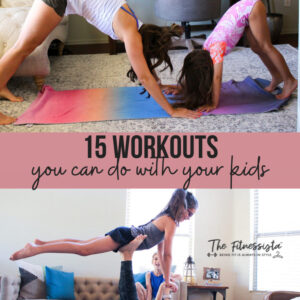Lessons to teach kids about working out
Sharing some of my favorite lessons to teach kids about working out.
Hi friends! How are you? I hope you’re having an amazing morning!! Today, I’m taking a hot yoga class and looking forward to family dinner later tonight.
For today’s post, I wanted to chat a bit about working out with kids!
The truth is that kids are not nearly as active as they used to be. With screen time, school, and homework, it can be a bit harder for them to make movement a priority. Also climate, safety, and accessibility can be factors that influence movement. For example, it’s a million degrees here in the summer, so for kids to move their bodies, you have to get creative indoors (or hit up a rock climbing gym, obstacle course, or trampoline park), or jump in the pool!
General recommendations are for kids to move their bodies for 60 minutes every day.
It’s pretty obvious around here lol but I view exercise as a lifelong habit that benefits both physical and mental health. Instilling a love for movement in kids can set them up for a healthy and active life! Teaching kids about working out isn’t about rigid fitness routines, but helping them appreciate movement, develop strength, and have fun.
Today, I wanted to share tips on sharing a love of fitness with your kiddos!
*It’s also worth mentioning here that kids are always watching! You can tell them whatever you like, but they’ll learn from your actions more than anything. If you view exercise as a joyful and consistent part of life, they will, too!
7 Lessons To Teach Kids About Working Out
Lesson 1: Exercise Is Fun and Playful
Kids view movement as play, and *exercise* doesn’t have to be structured. Encourage activities like tag, jumping jacks, or dancing.
You don’t even need to call it exercise; it can just be play time. Our kids LOVE flashlight tag indoors, or the “monster game” (where I hide somewhere, they find me and I chase them until they get to base.)
Lesson 2: Movement Can Improve Mood and Energy
Teach kids how exercise, like a brisk walk or light yoga, can boost their mood and give them energy for the day. Often, they’ll notice this for themselves. P asks to go on a walk every single day because she’s noticed that it brightens her mood and she genuinely enjoys it. There’s a huge connection between movement and mental health, and when the kids get anxious or moody, we head outside.
Lesson 3: Strong Bodies Help Us Do More
Building strength helps kids perform better in sports and daily activities.
Use kid-friendly examples: “Strong arms help you climb, and strong legs help you run faster.” The kids have also learned that strength training supports the activities they like to do. Sprints help P run faster down the basketball court, and core exercises support Liv’s dancing.
Lesson 4: Exercise Isn’t About Looking a Certain Way
It’s important to emphasize that working out is for health, fun, and feeling good—not for appearance.
Help kids develop a positive body image by focusing on abilities rather than aesthetics. I never mention what their bodies, my body, or anyone else’s body looks like. It’s all about how we feel!
Lesson 5: Rest Days Are Important
Teach that rest is essential for recovery and growth. Show kiddos that it’s ok to take a rest day and enjoy more restorative activities so they can see you stretching, using the sauna blanket, or taking a nap. A mix of activity and rest can help keep their bodies strong and injury-free.
Lesson 6: You Don’t Have to Be Perfect
Let kids know it’s okay to try new things and not be good at them right away! Share how everyone, including adults, learns over time and gets better with practice. It’s also fun to do things for the first time together, like pickleball or rock climbing; I like to learn new things as a family.
Lesson 7: Working Out Can Be a Family Activity
It’s great to get the whole family involved! Some of my favorite group activities are family bike rides, hikes, group yoga (the kids LOVE goat yoga!), or doing workouts together at home. The kids also love Just Dance on the Wii! We can be a little competitive and move our bodies 😉
How To Motivate Kids To Exercise
Tip 1: Lead by Example
Kids often model their behavior after parents. If you view exercise as a joy and privilege, and not a punishment, it’s likely that they will, too. I also never tie my workouts to how my body looks; I say things like, “Wow, that walk gave me a ton of energy.”
Tip 2: Make It a Game
Turn exercise into games like obstacle courses, scavenger hunts, or fitness challenges. Exercise doesn’t need to be official exercise; any movement is good movement.
Tip 3: Set Goals Together
Help kids set small, achievable goals like mastering 10 push-ups or running for 5 minutes without stopping.
Celebrate their achievements with them 🙂
Tip 4: Use Positive Reinforcement
Praise their effort rather than results. Share how encouragement builds confidence and keeps them motivated. It’s also important to turn the recognition inward and see how proud they feel of themselves. I also try not to make it a big deal: we move our bodies every day, we make it fun, and we go on with our lives. It’s just an inherent part of our days.
I think that teaching kids to appreciate working out is a gift that can last a lifetime. I WISH I would have learned how to strength train when I was younger (instead of nervously stumbling around the gym in college) and how to detach movement from physical appearance. It would have enabled me to find workouts that I enjoyed instead of punishing myself by burning as many calories as possible. Live and learn, and I think that a positive workout mindset, and consistency are two amazing gifts we can give our kids.
Please share any of your own tips or lessons in the comments section!
Here are some ideas for workouts with kids.
xoxo
Gina
















